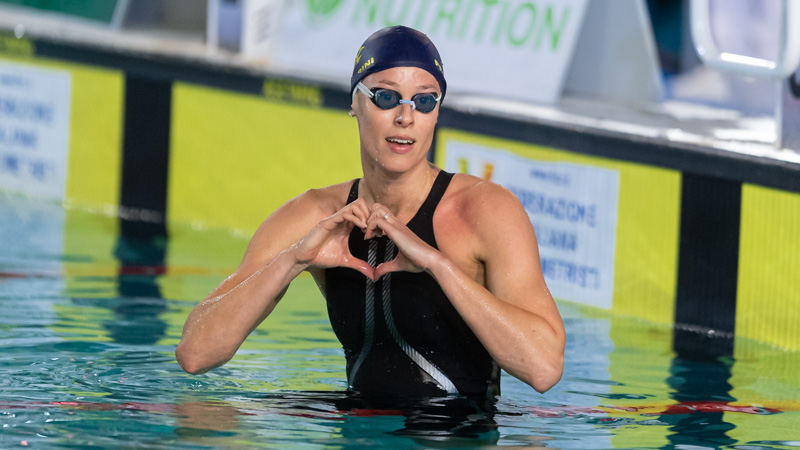This article originally appeared in the 2022 Summer edition of SwimSwam Magazine. Subscribe here to the SwimSwam Magazine here.
In Athens in 2004, she surprised everyone except herself by winning the silver medal in the 200 freestyle at age 16. At Beijing 2008 she experienced the moment of greatest sporting glory with the title she had missed four years earlier. London 2012 had a bitter taste, like a medicine you throw down to get better and, after that fifth place, a new era had begun.
Four years later, an even more painful fourth place in the Rio 2016 pool. A pain that was useful to give her the energy to keep pushing for one last dance. Tokyo 2020, or 2021 to be precise, did not bring medals, but it made her the first female swimmer to have swum the Olympic final of the same event in five consecutive Olympics, meaning a 17-year-long journey.
After five Olympics as an athlete, all of them spent as a protagonist, living with all the lights on her, Federica Pellegrini experienced a new first time after almost 20 years after her debut under the five circles.
“The Beijing 2022 Winter Games was my first time at an Olympics as a member of the IOC in the Athletes Commission. It was a strong emotion, and I feel a great sense of responsibility linked to this role. When you are an athlete, you don’t even realize the mammoth work behind events like this. How many people work to make sure everything goes well, and how much attention is paid to every little detail. ”
The famous Beijing “Water Cube” was dressed up for the occasion, becoming the “Ice Cube.”
“My hotel was right in front of the Water Cube, which for me will always be the Water Cube. However, it took me over an hour to reach it due to restrictions because of COVID. Being there to represent all the athletes was very exciting.”
The path, the one to become a member of the IOC, started almost as a joke and then became a full-time commitment.
“It’s something I never really thought about. And when they proposed it to me, I didn’t think I would be elected. Then I started doing some electoral campaigns, even if I’m not good at it, and during the Tokyo Games, it was strange to be there both as an athlete and as a candidate. I was the youngest of the candidates. I remember when they said my name among the winners, we cheered like a goal in a soccer match. It is an honor because the vote comes directly from the athletes. And it is wonderful to be recognized and wanted as a spokesperson not by the managers or by the press, but by athlete to athlete.”
From athlete to athlete, working for the good of athletes.
“The most important points we are focusing on are two issues that are very dear to me: gender equality and mental health. These are issues that need to be addressed, and as a commission, we are bringing forward many ideas for the well-being of athletes worldwide. My mandate will last seven years, and I am confident that many things can be done in this period. Among other things, in 2026 we will host the Winter Olympics in Italy, and I think it will be a huge emotion for me and for all my compatriots.”
When in Beijing, Federica returned to the pool that gave her the Olympic gold after 14 years. In August, Federica will return to another special place for the first time as a former swimmer.
“The swimming pool of the Foro Italico will always be special for me. It is the most beautiful pool in the world, and some of my most beautiful memories are linked to that place. I have been back many times, but this summer it will host the European Championships. The first international event after the 2009 World Championships. I’ll be there. I don’t know what role yet, but I’ll be there. And I believe it will be a great event and that the Italian team will be among the protagonists.
We have a very strong team, especially in the men’s area. We have two or three great talents among the women, but we should work better to raise the average level. In Italy, we will never be able to focus on quantity, and therefore we must work on quality, trying not to lose youth talent along the way, following them on a path, step by step. Starting actually from themes like gender equality and mental health. Perhaps by also increasing the number of women on the national team’s technical staff, such as doctors, physiotherapists and psychologists. Sometimes these things make a difference.”
Every place has a memory, and every person has a memory linked to that place. In 2009, in the pool of the Foro Italico in Rome, Federica Pellegrini swam the world record of the 200 freestyle in an epic and legendary race. When she returns to that place, she will find out who the new European champion of that event will be. Because even if places do have a memory, they are there to tell us about the present and look to the future. Exactly like Federica does, from athlete to member of the athletes’ commission.
